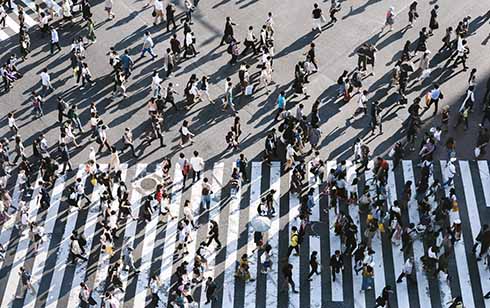
crowds walking to work
The 1918 Spanish Flu pandemic teaches us about relationships, with each other and God, as much as it does about medical interventions.
This year is the centenary of the Spanish Flu pandemic. In 1918 it took many more lives than did the four years of war that ended that year.
July came in a lull after its violent onset, before its even more lethal and dispiriting return later in the year. Its virulence reflected its power, but also testified to the connection between the injustices and inequalities of human society and the victims of epidemics.
It is easy to think of medical science in 1918 as relatively ignorant of ways to block and treat a dangerous virus. Yet previous experience and medical discoveries had taught that the virus was spread by air, and so from the nose, mouth and hands of people infected by it. Its spread could be limited by washing, masking one’s nose and mouth, and avoiding the opportunities for people to meet in crowds.
Governments, however, shrunk from enforcing these measures, under pressure from businesses that would lose profit and from workers who needed money to live. People who were poor often lived in squalid and overcrowded quarters with poor sanitation, an ideal environment for the spread of the disease. The death toll in India and other colonies which were deprived of food and medical resources in order to support European wars was particularly high.
The spread of the disease was also facilitated by soldiers returning from war. Often ill fed and vulnerable to infection, they carried the infection to their homelands. In Europe, too, the war had led to rationing of food and the lack of basic services, leaving people open to infection. Flu was yet another of the evils inflicted on their people by rulers who went lightly to war.
More people died of pneumonia and other complications after the flu than from the flu itself. The people most vulnerable were those whose health was already weakened by inadequate food, shelter and access to medical care. The flu virus sowed death; poverty and inequality reaped the harvest.
The flu epidemic reminds us that the way in which bad relationships feed the destructive power of epidemics, hurricanes and other so-called acts of God. The safety of human beings depends on the quality of the network of relationships that connect them to one another and to the world. When inequality and violence and reign, people are vulnerable.
In churches and in our parishes, building good and respectful relationships is a foundational work. It enables people who are disadvantaged to connect with society and draws attention to effects of gross inequality on health and the human spirit.
Photo by Ryoji Iwata on Unsplash